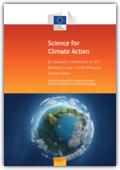What is Earth System Science and why does it matter?
The Earth system includes a complex network of physical, chemical, and biological processes that interact with each other in various ways, not yet fully understood.
For example, the Earth's atmosphere, oceans, land surfaces, and ice sheets are all interconnected, and changes in one system can have ripple effects throughout the entire planet.
Earth system science is about understanding these complex interactions, which requires sustained research effort, in working across different disciplines and overcoming challenges associated with technological capacity to gather and process the necessary data.
By studying the Earth system, researchers can develop more accurate climate models that can help us predict how the planet will respond to different levels of greenhouse gas emissions and other human activities.
For instance, models show that Earth’s temperature would not have changed if it were not for human activities, by comparing both scenarios. Such information is essential for policymakers who are working to develop effective strategies for mitigating climate change and adapting to its impacts.
What role does EU research and innovation play?
Horizon Europe, the EU's research and innovation programme for 2021-2027, dedicates to climate action 35% of its total budget. The EU is among the top funders of the evidence base underpinning the reports of the Intergovernmental Panel on Climate Change (IPCC), the most authoritative source of knowledge on climate change.
EU-funded research plays an important role by filling critical knowledge gaps, increasing the robustness of research findings, and building consensus among the international scientific community.
This way, EU-funded projects contribute to advancing our understanding of the Earth system, which in turn allows for better prediction of the interaction between natural phenomena and human activities.
EU-funded projects expand our understanding of Earth system processes and help improve their realism in models, increasing their quality and reliability to make climate projections.
With the results of this research, we are better positioned to assess and anticipate future impacts of climate change on nature and society, making mitigation and adaptation responses much more effective and targeted.
The projects addressed in this area range from functioning of the carbon cycle and assessments of carbon budgets, through modelling of Earth System processes, improving climate predictions and projections, up to the representation of bio-geo-chemical cycles, supporting research into methane, icesheets or tipping points.
EU Projects
Projects currently supported by Horizon Europe under Destination 1 “Climate sciences and responses for the transformation towards climate neutrality” of Cluster 5 (Climate, Energy and Mobility):
2024 call
2023 call
2022 call
2021 call
For examples of older projects funded under earlier work programmes please refer to the brochure Science for climate action: EU research contribution to IPCC working group I on the physical science basis.
Documents

- Report
- 16 February 2024
Insights from the authors of the IPCC 6th assessment report on knowledge gaps and priorities for research.

- Report
- 14 December 2022
